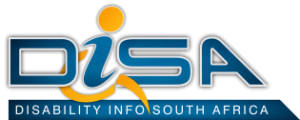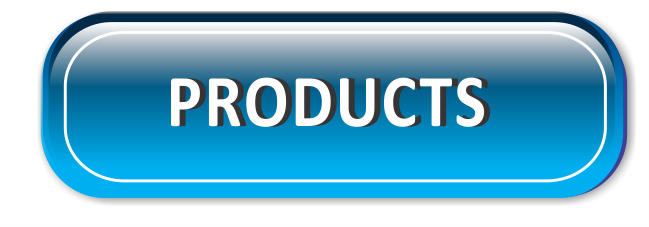Hearing Dogs & Equipment
Introduction
"Assistance or Service Animals are defined as animals that are individually trained to work or perform tasks to assist persons with disabilities." There are a variety of different types of animals that can be trained as Assistance Animals, these include but are not limited to Monkeys; Miniature Horses and Dogs. The only Assistance Animal that is currently used and trained in South Africa, are "Assistance or Service Dogs," these Assistance Dogs come in all shapes, sizes and breeds and also include mixed breed dogs. Assistance Dogs are trained by Accredited training companies and organisations such as Smart Service Dog, Paws4life Training Academy, Honey’s Garden For Medical Alert Dogs SA and The S.A. Dog Training College. Through this training that both the dog and handler receives from these companies and organisations above, the dog will learn how to provide assistance to their handler and the handler will be required to train with their dog to learn how to communicate with their Assistance Dog.
There are various types of Assistance Dogs that are trained in South Africa to assist persons with various disabilities or impairments, these include Assistance Dogs that can assist persons with:
- Diabetes or Mobility Impairments - These are known as Diabetic Alert Dogs or Service Dogs respectively and can help persons with Diabetes, or those who use wheelchairs, or need assistance with balance.
- Visual Impairments - These are known as Guide Dogs and are used to guide people who are blind, or those who have Visual Impairments.
- Hearing Impairments - These are known as Hearing Dogs, or Alert Dogs, they can alert persons who are Deaf or those who have Hearing Impairments.
- Intellectual Impairments - There are a variety of different types of Assistance Dogs that can assist persons with Intellectual Impairments including, Autism Support Dogs; Psychiatric Service Dogs and Seizure Alert Dogs which alert and protect a person who is having a seizure, reminding a person with mental illness to take prescribed medications, etc.
- Therapy Pets/Dogs - A Therapy Dog or Therapy Pet is a dog that is trained so that they can provide affection, comfort and support to people in settings such as hospitals, retirement homes, nursing homes, schools, libraries, hospices, or disaster areas.
Assistance Animals are working animals, not pets, the work or task that an Assistance Dog has been trained to provide must be directly related to the person's disability or impairment.
On the page below we will list and discuss these different types of Assistance Dogs that can assist persons who are Deaf or those with Hearing Impairments; The companies, organizations or individuals that specialize in training these different types of Hearing or Alert Dogs in South Africa; The equipment that is required by law to be worn by these Assistance Dogs and the rules and regulations regarding access to Assistance Dogs in public places and on public transport.
Types of Assistance Dogs
An Assistance Dog should have a good temperament, good health (physical structure and stamina) and be obedient and capable of being trained. Labrador Retrievers, German Shepherds, and Golden Retrievers are 3 of the most common breeds used as Assistance Dogs, but any breed or mix of breeds of dogs are capable of becoming an Assistance Dog if they have the above qualities. Some Assistance Dog training organizations or companies, however only train specific breeds of dog and dogs that they themselves breed. An example of this, is The South African Guide-dogs Association for the Blind, while companies and organisations such as Smart Service Dog, Paws4life Training Academy, Honey’s Garden For Medical Alert Dogs SA and The S.A. Dog Training College can guide you and help source suitable dogs that can be trained by them as Assistance Dogs.
Assistance Dogs can be trained to assist persons who are Deaf or have Hearing Impairments in a variety of different ways, including:
- Hearing Dogs at Home: Hearing Dogs are trained to alert persons who are Deaf to household sounds that are necessary for everyday safety and independence. They are trained to make physical contact and lead their person to the source of the sound or away from danger. Through sound awareness and companionship, these dogs provide greatly increased freedom.
- Hearing Dogs in public: A Hearing Dog provides a person in public an increased awareness of his or her environment. A Hearing Dog is trained to alert to sounds, such as a siren or honking horn, in public, when a person who is deaf or hard of hearing takes a Hearing Dog into public, he or she will gain an awareness of the environment by paying attention to whatever the Hearing Dog is reacting to. When the dog hears something and looks, the person will notice and turn to see what's happening as well.
Other Benefits of Owning an Assistance Dog
Studies show that owning an Assistance Dog also provides positive effects psychologically, socially, and physiologically, they offer additional benefits to those listed above and generally also reduce anxiety, depression, and loneliness. Due to the support, security, and companionship that they offer, stress is reduced, which in turn improves cardiovascular health. “A number of studies identify pet ownership as a factor in improved recovery from illness and improved health in general”. Assistance Dogs also make it easier to get around, resulting in the person getting more exercise or walking more often. People are generally more willing to go out and therefore feel a sense of independence, as they meet more people. Socializing becomes easier, as Animals lead to increased interaction with other people. In many cases, Assistance Animals offer a life changing experience and owners of Assistance Animals share a special bond with their animal, they are even sometimes referred to as a member of the family. It is however important to remember that Assistance Animals are working animals and should not be distracted while they are working.
Companies & Organisations That Can Assist
Assistance Dogs are required to be trained by an accredited training facility which will not only teach you how to train your Assistance Dog to assist you, but will also assist you to train your dog to behave well while out in public. There are various organizations, companies and individuals in South Africa, who are accredited and specialise in Assistance Dog training, this includes the Smart Service Dog, Paws4life Training Academy, Honey’s Garden For Medical Alert Dogs SA and The South African Dog Training College (SADTC). Some organizations and companies such as the South African Guide-dogs Association for the Blind, also breeds and provides the dogs that are trained as Assistance Dogs but not Hearing or Alert Dogs.
Training of an Assistance Dog can take months or even years to complete, this is to ensure that the Assistance Dog can assist its handler and can be prepared to accompany them on airplanes, buses, boats and into restaurants as well as other public places, without being distracted by strange noises, crowded areas, etc. Once the Assistance Dog has qualified, it will be registered with that organization or company on their data base and a letter or card, as well as a jacket or bib will be presented to the handler, stating that the Assistance Dog has been trained and qualified with them.
Please read the information below to find out more about these companies and organisations that provides this training for Hearing or Alert Dogs and to find out more about the other services that they can provide.
Smart Service Dog
Smart Service Dog, is a Dog training facility in Durban that specializes in Puppy and Home Obedience Training. In 2016 Smart Service Dogs became an independent training school and started focusing not only on Puppy and Home Obedience Training but, very importantly training The Handler, Owner and Dog Trainers as well. Our courses at present include but are not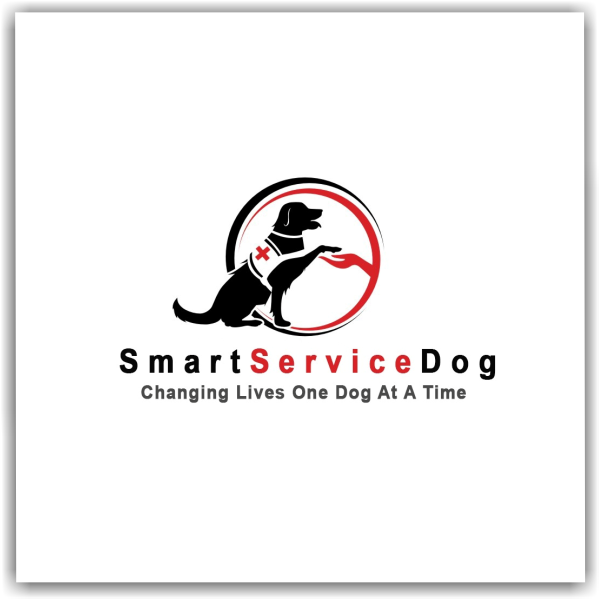 limited to the following: Dog Classes: Therapy Dogs; Puppy School; Home Obedience; Fun Agility – Canine Hooper’s World Accredited; Scent Work- TDS accredited; Animal Behaviour Training; CD Companion Dog-Working Trials; Canine Good Citizen Testing; Protection work and Rally Obedience Classes.
limited to the following: Dog Classes: Therapy Dogs; Puppy School; Home Obedience; Fun Agility – Canine Hooper’s World Accredited; Scent Work- TDS accredited; Animal Behaviour Training; CD Companion Dog-Working Trials; Canine Good Citizen Testing; Protection work and Rally Obedience Classes.
Animal-Assisted Therapy is a therapeutic intervention that incorporates animals, such as horses, dogs, cats, pigs, and birds, into a treatment plan used to enhance and complement the benefits of traditional therapy. It can be a useful intervention for individuals or groups and various studies have reported positive outcomes and improved emotional well-being in those with autism, medical conditions, or behavioral issues, as well as those battling illnesses like depression, schizophrenia, or addiction.
Smart Service Dog Training Centre train in five main fields these include: Autism Assistance; Psychiatric Service Dogs; Seizure Alert Dogs; Mobility Assistance and Hearing Assistance.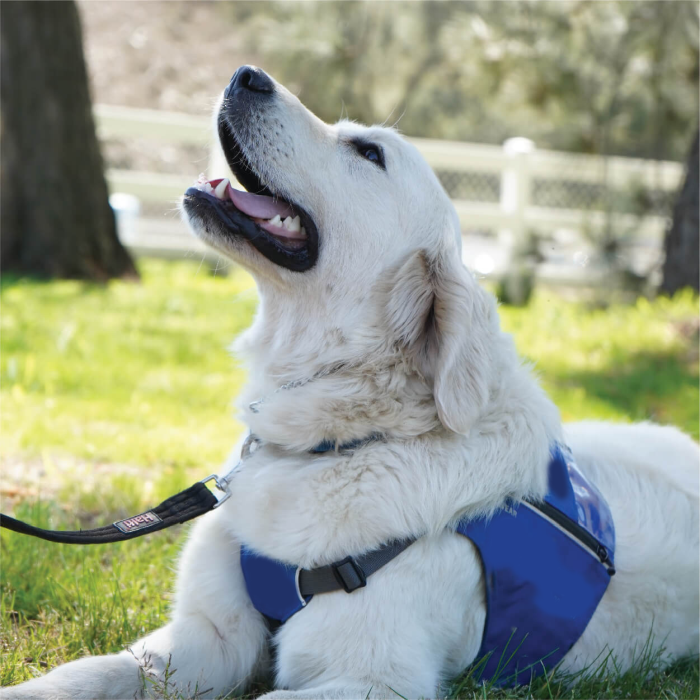
Hearing Assistance: Hearing Dogs enable those who are deaf or hard of hearing to be more aware of their surroundings. These dogs can accompany their handler into public settings and will naturally give off sound cues to the handler. For example, if the dog looks to his left the handler will know their is an auditory signal coming from that direction, which prompts the handler to look to their left to see if it is something they should respond to. Hearing Dogs are also trained to purposefully alert their handler to certain sounds in the home. These dogs are trained to paw at their handler’s leg when the smoke alarm goes off, the doorbell rings, the microwave dings, or the teakettle whistles. Hearing Dogs are trained on a case by case basis for the specific sounds each recipient will need to be alerted to. These dogs can be a small or large breed, as size is not a factor.
Should you have any queries please feel free to contact Smart Service Dog via either the contact form on the website: www.smartservicedog.co.za, or email Grant Smith on: grant@smartservicedog.co.za. Alternatively contact him on his mobile: 081 270 4672.
Paws4life Training Academy
The Paws4life Training Academy is a specialised K9 training facility based in Cape Town and started in 2015. We live by the motto: “Your dog is not just a dog”. We not only train puppies and dogs but we create an everlasting bond between human and dog.
Our founder has specialised knowledge in various areas of dog training and is also a qualified behaviourist. Paws4life has a few trainers who are qualified in their areas and specialities.
Through education, we strive to improve the lives of animals and in turn improve the lives of their people – cementing the bond between humans and canines. We also strive to provide affordable dog training that provides for the needs of all dog owners. At the same time Paws4life training academy has a social responsibility to ensure that the dogs we train are safe around children, not a danger or a nuisance to their owners or the public and that their animals rights are upheld and considered at all times.
We are committed to:
- Consistent, reliable and the optimal educational quality
- An atmosphere of understanding, learning and fun
- Friendly and caring staff and management
- Meeting the needs and exceeding the expectations of all our stakeholders, suppliers and clients
- Creating a better life for dogs and their people through usability of our training in the home environment and reflecting our philosophies of trust, honesty, honour, virtue and integrity in all contacts with Paws4life.
What is our business philosophy?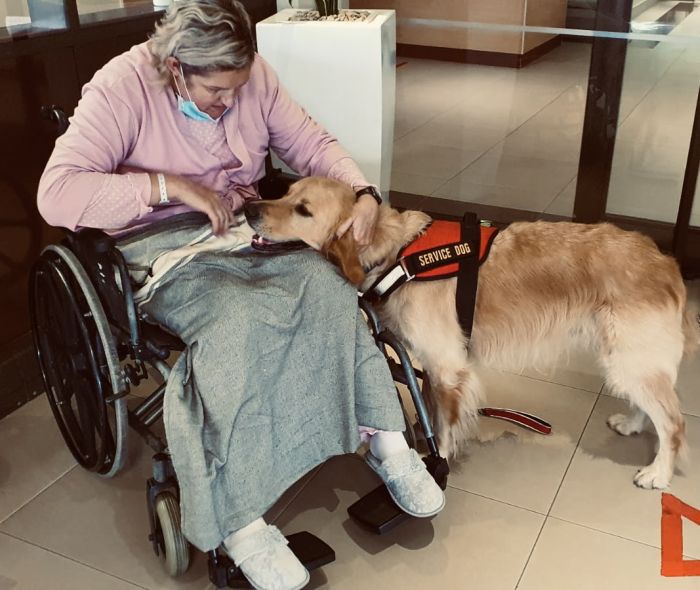
- Delivery of quality in all encounters
- Trust through long-term relationship development
- Nurturing a learning environment
- Fun for person and pooch alike
Our courses include but are not limited to: (Please do note there are much more.)
- Puppy classes
- Adult dog classes
- One on one training
- Behaviour modification programs
- Therapy Dogs
- Service Dogs
- Hearing Assistance Service Dogs – Alert individuals who are deaf or those who have Hearing Impairments about noise that warns against potential harm, or if someone is calling them.
- The Paws4life Training Academy also assist with the training of: Psychiatric Service Dogs; Seizure Alert Dogs; Diabetic Alert Dogs; Mobility Assistance Service Dogs; Multipurpose Service Dogs and Autism Assistance Service Dogs.
All Service Dogs will go through assessments as they qualify through all the various training levels, they need to go through a KUSA Good Citizen testing bronze level and will only be able to qualify when they pass all the testing and assessments.
If you require any further information or are interested in Service Dog Training, please feel free to contact Calika Morries from Paws4life Training Academy on Phone: +27 72 445 4310 or via Email: paws4lifetraining@gmail.com or visit our website at: www.paws4life.co.za
Honey’s Garden For Medical Alert Dogs SA
Honeys Garden is a nonprofit, 2016/387235/08 organization whose mission is to place quality service dogs with people within South Africa who are under privileged, fighting with disabilities or diseases, and veterans who have lost use of limbs or hearing. We also help with animal rescue and educate the public regarding use of service dogs in public places. We enrich the lives of children and adults with medical disabilities and diseases by matching them with task trained service dogs. We also supply and utilize specifically trained TheraPets for working professionals and individuals. We are the first company to train Medical Service Dogs in South Africa! All of our Service Dogs and Therapets undergo stringent testing, including the KUSA Canine Good Citizen Award.
supply and utilize specifically trained TheraPets for working professionals and individuals. We are the first company to train Medical Service Dogs in South Africa! All of our Service Dogs and Therapets undergo stringent testing, including the KUSA Canine Good Citizen Award.
Honey’s Garden For Medical Alert Dogs SA is run by Lucy Breytenbach (Director/Founder) and is enriching the lives of families across the country by providing quality task trained service dogs. We aim to increase the confidence and independence of those in need, and their families. We have successfully introduced medical service dogs, and Therapets for working facilities into South Africa. Our dogs save and change lives on a daily basis.
The dogs that we are currently able to provide include but are in no way limited to:
Hearing Dogs – Hearing Dogs are able to assist people with partial to full hearing loss by alerting them to sounds in their environment. They give their owners a sense of freedom and renewed self-esteem. Being deaf can be extremely frustrating and scary for anybody, we aim to help our patients (especially children) to feel safer and more secure in their environment, and ease the fear that they may experience. A hearing dog can also relieve the loneliness and isolation that many deaf people feel in a world which relies so heavily on sound. They can be a bridge whilst in the outside world by providing more opportunities to socialise. Hearing dogs are trained to recognise specific sounds, make physical contact with their owners, and give a trained alert signal accordingly and lead their person to the source of the sound.
Our dogs can be trained to respond to a variety of sounds, including but not limited to:
- Doorbells; Phone or clock alarms
- Car hooters
- Their owners name
- Telephone/TDD/TTY and Smoke Detectors
- Emergency vehicle sirens
- Kettle when boiling or Somebody knocking at the door
- Intruders
For people with hearing loss, the absence of sound can be life-threatening. We understand the seriousness of this and endeavor to train quality reliable service dogs for our people in need.
- We also assist with the training of: Psychiatric Service Dogs; Multipurpose Assistance Dogs; Seizure Response Dogs; Diabetic Alert Dogs; Autism Assistance Service Dogs
- TheraPets (Facility Dogs) (Our own or workplace orientated.)
Our training takes place at our facility in Cape Town, as well as out and about in local public spaces. This is so that we build confident reliable dogs who can work in any environment that they are placed in. We are able to place dogs across the country as long as families are able to attend an initial meeting or facilitate a video interview (to discuss needs and lifestyle so that we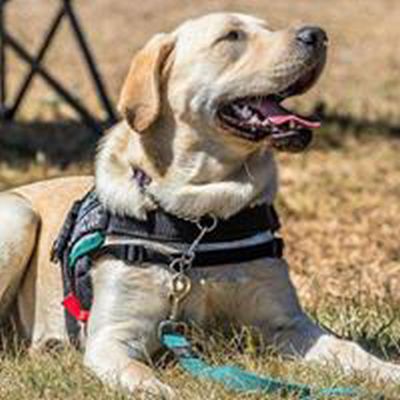 can match the perfect dog to their team), and spend 2 weeks at our facility upon completion of their service dog. This 2 week full time workshop will enable applicants to learn what is expected of them, and how to handle their service dog when they get home.
can match the perfect dog to their team), and spend 2 weeks at our facility upon completion of their service dog. This 2 week full time workshop will enable applicants to learn what is expected of them, and how to handle their service dog when they get home.
We carry out a graduation ceremony for the dogs and new owners upon completion of their public access test (near end of workshop). All families will leave with their dog and a starter pack with notes, information and goodies to get them started at home. We suggest that service dog teams join a weekly obedience school in their local area (we will gladly assist in sourcing a quality training school) in order to maintain confidence when working with their dog. We are also available to take questions and troubleshoot via video call should you require it, and you are always welcome to pay us a visit or join our local classes in Leadville Dog Park, Leadville Way Sunningdale, Cape Town, 7441, or contact Lucy Breytenbach on Mobile: +27 72 250 0336, via Email: honeysgardensa@gmail.com, or through their website at: www.medicalalertdogs.co.za.
The South African Dog Training College (SADTC)
The South African Dog Training College and Kennels (SADTC) is a dog training school which was established in 1984 by Chris and Christine van der Westhuizen. 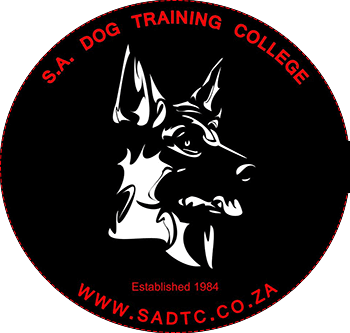 In 1984, puppy socializing, agility, consultations, etc. were hardly known to South Africans and SADTC brought these and many other courses to South Africa in a big way. The SA Dog Training College offers a wide variety of Dog and Puppy Training including Therapy and Service Dog Training as well as various other services, including Dog Training Instructor Classes; Local and International Seminars; Sourcing Trained Dogs; Inboard (Kennel) Training; Home Dog Training; Social and Fun Events and Dog Physio Therapy. The SA Dog Training College also supplies Dog Equipment and is now also offering Therapy and Service Dog Courses in South Africa, which fulfills a huge demand for this. The S.A. Dog Training College and Kennels offers training for a variety of Service Dog training including: Autism Support Dogs, Alert Dogs, Service Dogs for persons with physical disabilities and Therapy Dogs. "Our prices are extremely reasonable."
In 1984, puppy socializing, agility, consultations, etc. were hardly known to South Africans and SADTC brought these and many other courses to South Africa in a big way. The SA Dog Training College offers a wide variety of Dog and Puppy Training including Therapy and Service Dog Training as well as various other services, including Dog Training Instructor Classes; Local and International Seminars; Sourcing Trained Dogs; Inboard (Kennel) Training; Home Dog Training; Social and Fun Events and Dog Physio Therapy. The SA Dog Training College also supplies Dog Equipment and is now also offering Therapy and Service Dog Courses in South Africa, which fulfills a huge demand for this. The S.A. Dog Training College and Kennels offers training for a variety of Service Dog training including: Autism Support Dogs, Alert Dogs, Service Dogs for persons with physical disabilities and Therapy Dogs. "Our prices are extremely reasonable."
Therapy dogs and handlers play a vital role with regards to working with cases of trauma, head injuries, illnesses and in retirement villages or hospitals. We have a therapy tester, and two therapy handlers, of which one is also a therapy instructor. They are qualified with DELTA, an international therapy organisation. We also offer training and testing right here in South Africa, as we are internationally endorsed with the Delta Society. Instructions and evaluations are now conducted locally by Christine van der Westhuizen who is an accredited alternate evaluator for Delta® and is conducting the local evaluations in the Gauteng Area.
Evaluations are also available on the South Coast from Heidi qualified as a Delta® evaluator who has also completed a number of Animal Behaviour Courses as well as Animal Assisted Activity Courses in South Africa and abroad and felt the need for trained handlers together with their pets to be qualified here in South Africa.
Please feel free to contact SADTC to find out more, email Christine on: info@sadtc.co.za or speak to her on: Tel: 065 860 6784 if you require any information, or you can visit their website at: www.sadogtraining.co.za.
Therapy Dogs/Pets
A Therapy Dog or Therapy Pet is a dog that is trained to provide affection, comfort and support to various people in settings such as hospitals, retirement homes, nursing homes, schools, libraries, hospices, or disaster areas. In contrast to Assistance Dogs, which are trained to assist specific patients with their day-to-day physical needs. Therapy Dogs are required to be certified and are trained to interact with all kinds of people, not just their handlers.
Therapy Dogs should be calm and social with strangers and should be able to adjust to loud noises and fast movements, they are tested on behaviors such as not jumping on people and being able to walk on a loose leash. Exact testing/certification requirements differ based on the organization's requirements. Some organizations offer classes such as "distraction-proofing," which strengthens the dog's ability to focus and Therapy Training, to help prepare the dog and the dog's owner for Therapy Visits.
Therapy Dogs are not limited to a certain size or breed, common breeds used in Therapy Dog application and research include the Golden Retriever and the Labrador Retriever, while Cavalier King Charles Spaniels are considered natural Therapy Dogs since they were bred to be companion dogs and love meeting new people including children, are very gentle, and are eager to sit on a someone’s lap for long periods of time and are small enough to do so. Therapy Dogs offer many benefits to people and patients, including encouraging people and patients to participate in physical activities and they help encourage them to have cognitive, social, and communication goals.
There are various organizations, companies and individuals in South Africa, who are qualified to train Therapy Dogs such as the The South African Dog Training College (SADTC), Smart Service Dog, Honey’s Garden For Medical Alert Dogs SA and Paws4life Training Academy. These organizations and companies also offer programs, whereby they visit hospitals, retirement homes, nursing homes, schools, libraries, hospices, etc. to provide support. Please read the information below to find out more or to contact them:
The South African Dog Training College (SADTC): We have a therapy tester, and two therapy handlers, of which one is also a therapy instructor. They are qualified with DELTA, an international therapy organisation. We also offer training and testing right here in South Africa, as are internationally endorsed with the Delta Society. Instructions and evaluations are now conducted locally, Christine van der Westhuizen is an accredited alternate evaluator for Delta® and is conducting the local evaluations in the Gauteng Area. You can contact Christine on: info@sadtc.co.za or speak to her on: Tel: 065 860 6784, if you require any further information, or visit their website at: www.sadogtraining.co.za
Paws4life Training Academy: Therapy Dogs and their handlers go through various types of training to be able to qualify once they pass all the testing and assessments. Please feel free to contact Calika Morries from Paws4life Training Academy on Phone: +27 72 445 4310 or via Email: paws4lifetraining@gmail.com or visit the website at: www.paws4life.co.za, If you require any further information or are interested in Therapy Dog Training, becoming a handler, or require Therapy Visits to hospitals, retirement homes, nursing homes, schools, libraries, hospices, or disaster areas.
Honey’s Garden For Medical Alert Dogs: Lucy Breytenbach (Director/Founder) - “Animals are my passion and my life, and I truly believe that dogs are one of Gods special gifts to us. It is known that dogs have the capability to comfort and protect people and that they are truly “man’s best friend”. Dogs will naturally console people, improve mental health and ultimately give unconditional love. Pets have been used as therapy for years, the lessons they can teach us are endless. We enrich the lives of children and adults with medical disabilities and diseases by matching them with task trained service dogs and also supply and utilize specifically trained TheraPets for working professionals and individuals. All of our Service Dogs and Therapets undergo stringent testing, including the KUSA Canine Good Citizen Award. Please feel free to contact Lucy Breytenbach on Mobile: +27 72 250 0336, via Email: honeysgardensa@gmail.com, or through their website at: www.medicalalertdogs.co.za. If you require any further information or are interested in Therapets, becoming a handler, or require Therapy Visits to hospitals, retirement homes, nursing homes, schools, libraries, hospices, or disaster areas.
Smart Service Dog: Animal-Assisted Therapy is a therapeutic intervention that incorporates animals, such as horses, dogs, cats, pigs, and birds, into the treatment plan. It is used to enhance and complement the benefits of traditional therapy. Animal-Assisted Therapy can be a useful intervention for individuals or groups. Studies reporting on Animal-Assisted Therapy found positive outcomes and overall improved emotional well-being in those with autism, medical conditions, or behavioral issues and it can be helpful for those battling illnesses like depression, schizophrenia, or addiction. Contact The Smart Dog via either the contact form on their website: www.smartservicedog.co.za, or email Grant Smith on: grant@smartservicedog.co.za, or contact him on mobile: 081 270 4672.
Alternatively Contact Us for more information.
Equipment Used by Assistance Dogs
In South Africa the law states that Assistance Dogs are allowed in public places such as buildings, restaurants on boats or airplanes, etc., where animals are normally not allowed. They are however required to wear certain equipment while out in public, which includes Assistance Dog Vests / Bibs and Harnesses. This equipment may differ between companies and organisations and according to the type of Assistance Dog that they are qualified as. Assistance Dogs that are in training often wear different colour bibs according to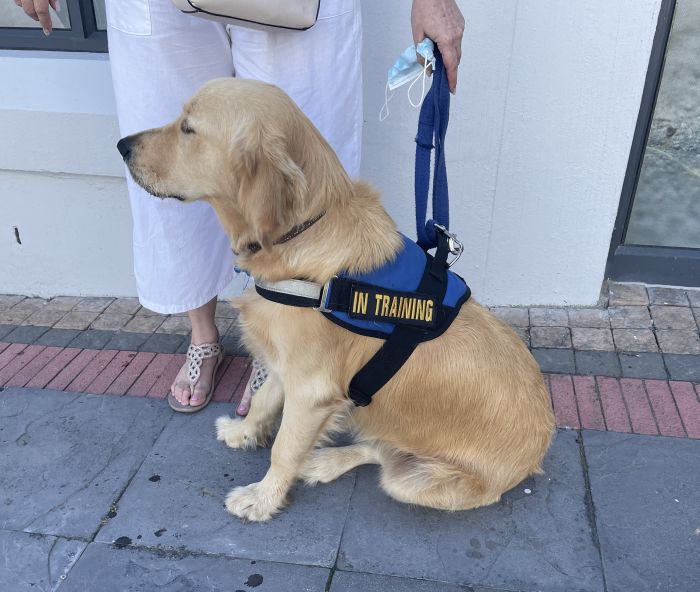 their level of training. These bibs and a variety of other equipment is available to purchase from the various organizations and companies that are accredited to train Assistance Dogs such as the The South African Dog Training College (SADTC), Smart Service Dog, Honey’s Garden For Medical Alert Dogs SA and Paws4life Training Academy. In most cases the training facility that assists you to train your Assistance Dog, will also supply you with a letter or card stating that your Assistance Dog has been trained by an accredited training facility. This letter/card is essential in-case someone objects to you entering their premises with your Assistance Dog. Access Poster - The S A Guide-Dogs Association for the Blind.
their level of training. These bibs and a variety of other equipment is available to purchase from the various organizations and companies that are accredited to train Assistance Dogs such as the The South African Dog Training College (SADTC), Smart Service Dog, Honey’s Garden For Medical Alert Dogs SA and Paws4life Training Academy. In most cases the training facility that assists you to train your Assistance Dog, will also supply you with a letter or card stating that your Assistance Dog has been trained by an accredited training facility. This letter/card is essential in-case someone objects to you entering their premises with your Assistance Dog. Access Poster - The S A Guide-Dogs Association for the Blind.
Unfortunately there is still some confusion from the public, including various restaurant and business owners who are not familiar with the regulations regarding Assistance Dogs. Up until recently there has not been any national registration process that registers Assistance Dogs in South Africa, however various companies/organisations have their own data base which they register their Assistance Dogs with. It is also believed that there is a company that are in the early stages of developing a registration process. Please Contact Us for more information.
Regulations & Rulings
As mentioned above, there are various regulations in-place regarding Assistance Dogs in South Africa and the access of Assistance Dogs into public places and buildings, where animals are normally not allowed.
An Assistance Dog is a working dog not a pet, they are essential to assisting many person with disabilities. Denying access to a person with a working dog is a form of discrimination and is against the law in South Africa. It should be viewed as the same as disallowing entry to a person who uses a Wheelchair or White Cane. Unfortunately many South Africans are still unaware of what an Assistance Dog does and how much training they have gone through to ensure that they are well socialised and behaved in public places.
Access Rights of Assistance Dogs
The Constitution of South Africa states that a person cannot be discriminated against due to their disability, which means that persons with visual, physical, hearing or intellectual impairments cannot be denied access to public places such as restaurants, retail environments, airports etc. due to the fact that they are accompanied by an Assistance Dog that has been trained by an accredited training facility.
Section 9 of the Equality Act in South Africa states that: No person may unfairly discriminate against any person on the ground of disability, including:
a) Denying or removing from any person who has a disability, any supporting or enabling facility necessary for their functioning in society;
b) Failing to eliminate obstacles that unfairly limit or restrict persons with disabilities from enjoying equal opportunities; or
c) Failing to take steps to reasonably accommodate the needs of such person.
This also applies to restaurants or shops that sell food: Establishments within the food industry are regulated by the Foodstuffs, Cosmetics and Disinfectants Act which states the following:
"In terms of the Foodstuffs, Cosmetics and Disinfectants Act, No. 54 of 1972 (“the Foodstuffs Act”) and regulation R962 (10)(i) governing general hygiene requirements for food premises and the transport of food, no animal, subject to the provisions of any law, is to be kept or permitted in any room or area where food is handled, except for guide dog accompanied by a blind person, who may be permitted in the sales of serving area of the food premises."
It is submitted that the provision logically extends to working dogs who are Service Dogs in the areas of Autism or Service Dogs required for persons with disabilities (other than blind persons) on the basis of the principles discussed above in relation to the Equality Act and Constitution.
Rulings With Regards To Access Rights of Assistance Dogs:
In terms of the above mentioned legislation, should you refuse access and/or service to a person with a disability with their Guide Dog, Service Dog or Autism Support Dog, appropriate recourse in the Equality Court or other appreciate forum may be sought against you and your company. We are covered by the South African Constitution and the United Nations Convention on the Rights of Persons with Disabilities (UNCRPD). Earlier this year, Judge Saldanha handed down a landmark judgement, the first in South Africa with the denial of access of a working Guide Dog.
The S A Guide-Dogs Association for the Blind (GDA) will advocate for the access rights of persons with disabilities who use a working dog that has been professionally trained by the Association (or any working dog trained by a member organization of the International Guide Dog Federation or a member Organisation of Assistance Dogs International). GDA will assist people who use working dogs to take advantage of the legal rights that they are entitled to. Alternatively please feel free to contact us via Yes to Access or fill out our Complaints Form.
South African Guide-dogs Association for the Blind:
- "Access Rights for Assistance Dog Owners" - Provided by South African Guide-dogs Association for the Blind.
- Is it Illegal to Deny Access to a Working Dog? - www.Guidedog.org.za
Links to the legislation:
